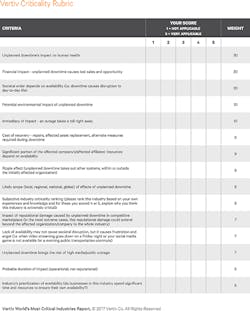Questioning Criticality
Ranking the World’s Most Critical Industries —
How do you quantify what’s most important to you? It might depend on time and circumstance. If you’re running late for a big meeting or job interview and the subway is stopped in a tunnel, the most important thing in your life might be getting that train moving again. If you run an online business hosted in the Cloud and your network is down, the only thing that matters is getting your website up and running again. If you’re a mom who hears about a school bus accident over the radio, nothing may be more important than your cell phone as you scramble to make sure your little one is safe.
These all could be nightmarish, potentially life-changing scenarios. What’s most important? The answer to that question and so many others is simply: it depends.
And yet, it’s a worthy question — one we asked a team of Vertiv experts to ask of IT-dependent industries and examine analytically. Which industry is most critical? If a network went down, how catastrophic would it be to the business? To customers? To the public? These are fascinating questions without easy answers.
The panel attempted to evaluate the criticality of various industries objectively, using a complex formula that considered 15 criteria and factored in a range of potential impacts of the loss of critical systems, weighted based on severity of impact. The results were a mix of the expected and some surprises, and the report presents the top 7 most critical industries based on the impact of a disruption as defined by that formula.*
It should come as no surprise to anyone reading this that telecommunications ranked near the top of the list — 3rd overall, to be exact. But before we dive into that, let’s take a closer look at how the panel defined and assigned value to criticality.
Defining Criticality
Again, criticality is largely subjective and dependent on circumstances. Business owners in a given industry can point to any number of reasons why their industry should rank higher on the list — the most compelling reason being their own reputation and bottom line. Almost every industry today relies on networks that can cripple a business if they go down for any significant length of time. This exercise attempted to eliminate some of the emotional reaction to any discussion of business criticality and analytically examine various industries.
The panel worked from 15 criteria tied to the impact of downtime, ultimately creating a rubric that enabled scoring and ranking of the most critical industries. Those 15 criteria were:
• Unplanned downtime’s impact on human health
• Financial impact of unplanned downtime in terms of lost sales and opportunity
• Societal order depends on availability
• Potential environmental impact of unplanned downtime
• Significant portion of the affected company’s/affected affiliate’s resources depend on availability
• Cost of recovery, including repairs, affected asset replacement, and alternate measures required during downtime
• Immediacy of impact
• Ripple effect from unplanned downtime
• Likely scope (local, regional, national, global) of effects of unplanned downtime
• Subjective industry criticality ranking
• Impact of reputational damage caused by unplanned downtime in the competitive marketplace
• Lack of availability causes frustration and angst
• Unplanned downtime brings the risk of high media/public outrage
• Probable duration of impact (operational, not reputational)
• Industry’s prioritization of availability
Telecommunications in a Familiar Spot
Long before we talked about Tier I, II, or III facilities, or "five nines" or any of the other designations for IT availability, the telecommunications industry was operating under the expectation of uncompromised reliability. The 20th Century telecommunications network set the standard for availability of critical services and continues to be the touchstone for reliability. Telcos understood their responsibility from the beginning: as soon as instantaneous communication became possible, it became indispensable. That truth became only more undeniable as we established emergency response systems reliant on telecommunications to function. Telco networks connected and eventually shrunk the world; everything about them is critical.
Because of that, telecommunications ranked 3rd on the list of most critical industries. Telecom scored highly among panelists in financial impact, societal order, immediacy of impact, and the effect of downtime on the company’s reputation. Telco providers not only prioritize and invest in critical systems to ensure availability, they spend millions in marketing dollars to promote the reliability of their networks to enhance customer confidence and create competitive differentiation. Enabling and ensuring connections is their business.
Of course, that business is changing. Voice over IP (VoIP) is taking traditional voice transmission to the Internet, triggering a larger trend of voice and data convergence. It also means telecommunications providers are no longer simply in the business of connecting phone calls; they’re delivering the Internet and TV and in some cases even creating their own content for consumption on these platforms.
This evolution — the integrated, simultaneous transmission of voice, audio, video, and data — required significant changes to network architecture and only ramped up the demands for anytime, anywhere connectivity.
Simultaneously, mobile communications have emerged over the last 20 years, and the industry has invested heavily to achieve similar levels of availability. The nature of mobile makes it nearly impossible to deliver the same level of availability as the traditional network, but the strides in this area in a short amount of time have been remarkable. Today’s cellular networks cover more of the globe more reliably than ever before.
As VoIP and mobile become increasingly entrenched in our daily lives, reliable power becomes more critical. Thirty years ago, a power outage might knock the lights out, but that rotary phone on the wall would continue to work (much to the chagrin, no doubt, of the people manning the phones at the electric company). Today, a power outage has a much larger impact on our ability to communicate — a fact that explains the industry holding the top spot on the Most Critical list.
As the next network generation is deployed to meet the demands of an increasingly virtualized world — with more devices connected to any network with low latency, high availability, and speed — geographic boundaries disappear. There is no need to be physically present in any particular place, because technology allows us to have a virtual presence in a variety of locations. The Internet of Things will expand the number of places and touch points we can reach exponentially. The communications network will remain critical because it virtually transports us to where we need to be. A loss in connectivity effectively disrupts our ability to operate vital applications across domains and locations. Businesses, cities, and individuals, then become invisible because their gateway to the rest of the virtual world has collapsed, impacting economies, security services, and our way of life.
A Surprise (Sort of) at the Top
Utilities ranked as the most critical industry. That might come as a surprise if you’re still thinking about decades-old coal-burning power plants, but it should not if you remember the 2015 computer hack that crippled the Ukrainian power grid. The world’s power grids may be clunky and decidedly old school in many ways, but make no mistake: they rely extensively on vast, intelligent IT networks to monitor and manage loads. And for the purposes of this report, "utilities" were defined as nuclear power, gas service, water treatment, and electric generation. That certainly sounds critical to us.
Reliable power is required for so many other services we rely upon every day, so any network downtime that results in power loss would have a dramatic impact. Its immediate impact can be far-reaching, as any of the 670 million people who lived through India’s massive 2012 blackout would well know. Blackouts can be major societal disruptors that resonate far beyond the utility companies themselves, impacting any business or individual reliant on electricity — or, more to the point: everyone.
The Rest of the List
Notably for telecom providers, Cloud and colocation services ranked as the 5th most critical industry on the list. Like telecommunications (and often in partnership) the business model for Cloud and colocation is directly dependent on availability. Telco and many other industries now depend on these platforms to deliver services to customers and employees, and outages can be crippling with ripples across many walks of life.
Mass transit, specifically air and rail, ranked 2nd on the list. The sheer volume of people impacted and the butterfly effect of any disruption make this entry on the list easy to understand.
Oil and gas production ranked 4th. These can be dangerous, complex sites with serious consequences of outages; a serious oil spill can result in an environmental catastrophe.
Defense and Smart Cities rounded out the list of the top 7 most critical industries.
Methodology
A team of global critical infrastructure experts developed this non-scientific ranking. First, they identified the 15 criteria that define critical systems, and then weighted each to create a criticality rubric, which panelists used, assigning a value of 1-5 for each criterion for each of 22 industries. When the weights were applied to these values, an aggregate score for each industry was computed. Averages for each industry were then calculated to develop the list of the most critical industries. (See Figure 1.)
Figure 1. The team of Vertiv experts used this rubric to calculate and rank criticality for multiple industries.
[toggle title=”Top 7” load=”hide”]World’s Most Critical Industries
Of the 22 industries analyzed, here are the industries that scored the highest on the criticality rubric (score in parentheses):
1. Utilities (712)
2. Mass Transit (643)
3. Telecommunications (634)
4. Oil and Gas Production (626)
5. Cloud and Colocation Services (614)
6. Defense (613)
7. Smart Cities (605)[/toggle]
Endnote
*For more information about, and to download, the report RANKING THE WORLD’S MOST CRITICAL INDUSTRIES, please visit https://www.vertivco.com/mostcritical.
Save
Save
Save
Save
Save
Save
Save
Save
Save
About the Author


